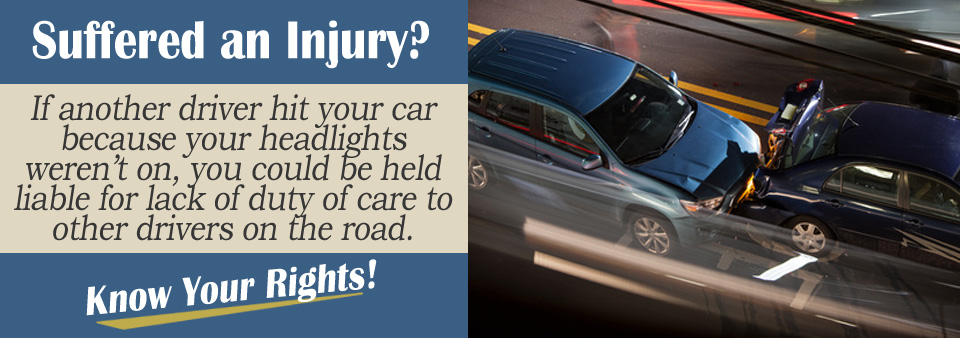You are driving on the road when you realize it: your headlights are not on. However, before you can fix the problem, another driver on the road hits you. He or she did not see you coming. Your car suffers extensive damages, as well as the other driver’s car.
However, because your lights were off, does this mean you are completely barred from filing a claim? We have asked attorney, Alaina Sullivan, about what you should do. Here is what she had to say:
Duty of Care
Any driver on the road holds a duty of care to others on the road. This duty of care requires that driver to act in a manner that a reasonable prudent individual would act. This duty involves protecting the safety of others on the road by following all traffic rules and regulations.
It is the reason why you have to pass a test to get your driver’s license. You need to know the rules of the road before getting behind the wheel.
Rule Number One
First and foremost, you must follow the rules of the road. One of those basic rules you are taught in driver’s education is to turn on your headlights upon sunset. If you are operating your vehicle on the road without your lights, you are not only endangering yourself but others around you.
Therefore, it would be fairly easy for the other party to show that you were negligent due to your lights not operating. Even if this was through no fault of your own, it is through regular maintenance that they could even argue that you should have reasonably known that your lights were faulty.
Therefore, that would lead to a breach of your duty of care to other drivers on the road.
Fault of the Other Driver
However, your action does not negate the actions of the other party involved. If the other driver is operating his vehicle in a reckless manner, that factor also comes into play.
If the other individual was intoxicated or distracted to the point where he or she would not have been able to avoid an accident had he or she been driving cautiously, you could pursue a claim against the other driver.
The other person’s fault could even come into consideration in terms of comparative negligence. This theory reduces your own liability by a percentage based on the amount of fault the other party had in the accident.

No Fault States
However, if you were in one of the states where no-fault insurance is the norm, you would file a claim against your own insurance company. Twelve U.S. states and the District of Columbia have what is called “no fault” insurance laws.
These states include Florida, Hawaii, Kansas, Kentucky, Massachusetts, Michigan, Minnesota, New Jersey, New York, North Dakota, Pennsylvania and Utah.
No-fault insurance means that your insurance company will pay some or all of your medical bills and lost earning damages if you get into an accident, not taking into account at all who is at fault. Laws vary from state to state, but in most, there is a limit to what your insurance company will pay you for, while some have no limit. In this situation, then, you would be responsible for filing a claim on your own policy.
Contact an Attorney Today
If you have been involved in a car accident and you think the other driver is at fault, you should contact an attorney today to discuss your case. A licensed personal injury attorney will be able to evaluate your case and determine if you have a claim against the other party’s insurance company.
To receive the compensation for your medical bills, property damages, and pain and suffering, you should speak with a personal injury attorney in your area today.